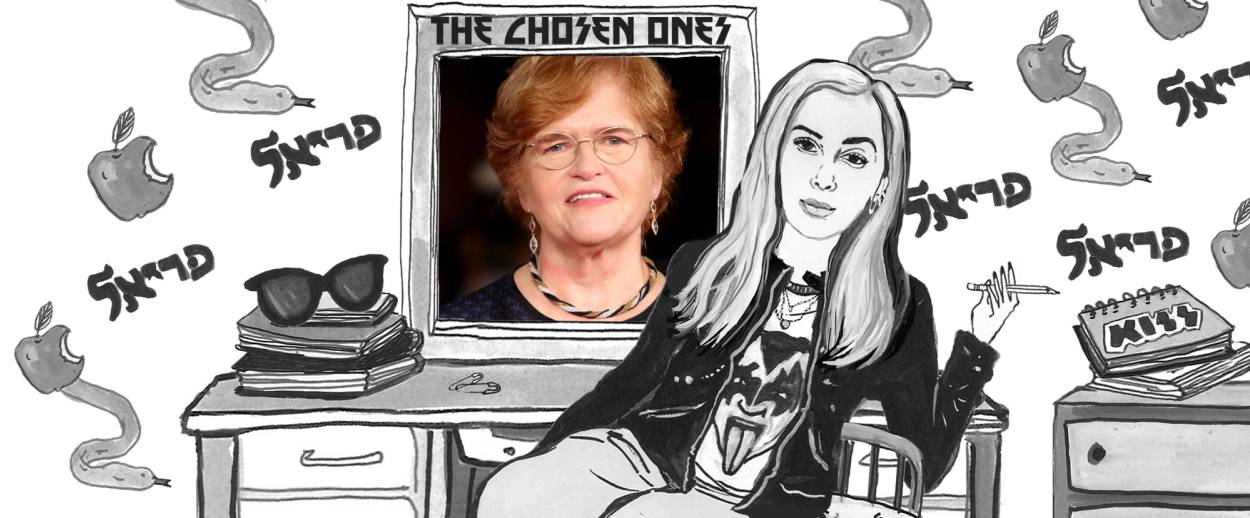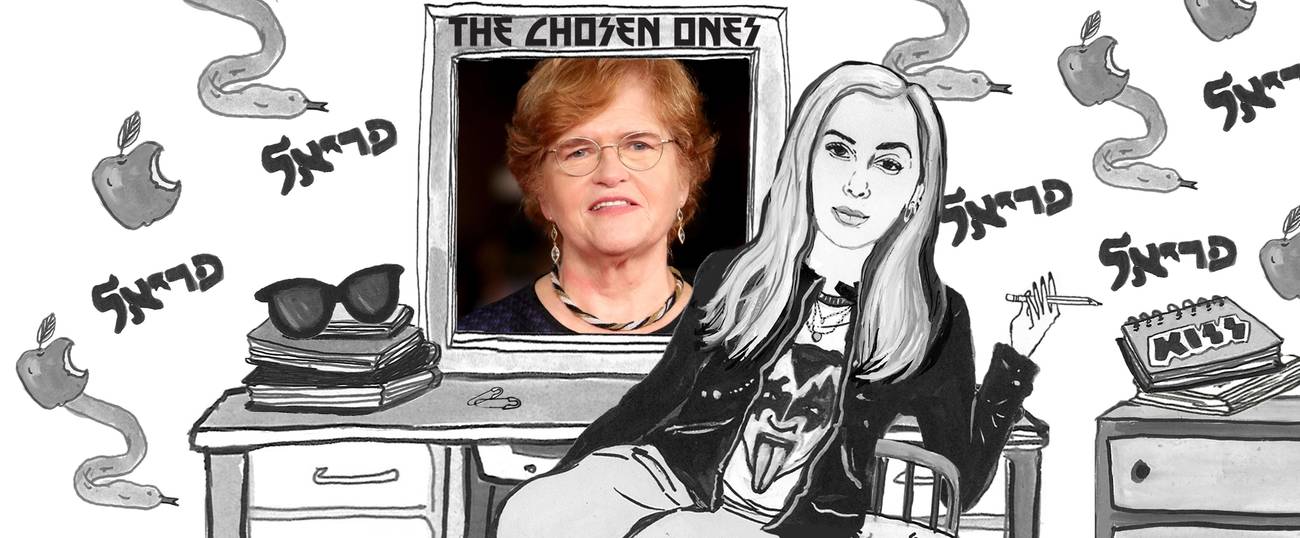The Chosen Ones: An Interview With Deborah Lipstadt
The historian, professor, and author on the importance of calling out Holocaust revisionist bullies, being portrayed on-screen by Rachel Weisz, and her favorite pair of oxfords




The Chosen Ones is a weekly column by author and comedian Periel Aschenbrand, who interviews Jews doing fabulous things.
Professor Deborah Lipstadt is serious business. She’s serious business in the way you’d imagine the Dorot Professor of Modern Jewish History and Holocaust Studies at the Tam Institute for Jewish Studies and the Department of Religion at Emory University should be. According to Emory (which, by the way, is widely considered to be one of the top universities in the U.S.), Lipstadt is “one of the nation’s foremost experts on Holocaust denial and modern anti-Semitism.” It comes as no surprise then, that she’s pretty big on facts.
Lipstadt’s now-famous book, Denial: Holocaust History on Trial, details her legal battle with author and Nazi sympathizer David Irving, who sued her for libel after she labeled him a Holocaust denier in her 1993 book, Denying the Holocaust: The Growing Assault on Truth and Memory. This drama is the subject of a new film, in theaters now, starring Rachel Weisz. She and I met recently to discuss everything from Nazis to what it’s like to have an Academy Award-winning actress create herself in your likeness. In person, Lipstadt is everything one would imagine she would be: smart and tough, no-nonsense but gentle, and cool as hell. She’s the epitome of your favorite professor with a little bit of rock star thrown in for good measure.
As far as I’m concerned, anyone who takes on Holocaust revisionist bullies like David Irving with such conviction is part superhero. Also there is something sort of magical of two super bad-ass women—Rachel Weisz and Deborah Lipstadt—coming together to burn the house down.
Periel Aschenbrand: Well, Rachel really got you down!
Deborah Lipstadt: It’s the mannerisms. But I know professionalism when I see it and she’s a professional. She said to me, “I’m not going to be imitating you, I’m going to create a character based on you.” And she went through a process of meticulous preparation.
PA: That must have been very refreshing to see, particularly as a professor.
DL: I had a sense that it was very important to her to get it right. You can tell when someone wants to get something right.
PA: Did you feel proud of her?
DL: I felt proud. I felt protective.
PA: Having a film made about you must be so exciting.
DL: “Exciting” is the right word, but it’s not the precise word. It’s exceptionally gratifying. This was a fight that I went into after they told me not to.
PA: Who is “they?” The British Jews?
DL: The British Jews came around. Many academics, leading historians—they told me I was wasting my time. It feels so gratifying to be portrayed by someone who understood the importance of the story and the significance of doing it. What none of us thought is that it would resonate today.
PA: But it does. And how.
DL: We have to stand up to bullies. I had a chance to stand up to a bully, a liar, a racist and an anti-Semite on a very public stage. If this movie gives people—young people—the courage to stand up and say, “That’s not true” or “That’s a lie,” well, that is gratifying.
PA: One has to be quite brave to stand up to bullies.
DL: I hate it when people say, “I would have fought.” I tell my students, “Imagine: you live in a ghetto. You have a chance to escape, to go to the forest, but you know your entire family will be on the first train to Auschwitz.” There is something I call “modesty of judgement.”
PA: Which means?
DL: It’s so easy to say that.
PA: Is there something similar between David Irving and Donald Trump?
DL: There is something about getting away with it.
PA: You say the British Jews came around to support you. What about the survivors?
DL: The survivors were behind me the whole time. Right before the verdict came in, they said, “Tonight you can sleep soundly, because none of us will be sleeping.”
PA: Who else was very supportive?
DL: Emory has been terrific. From the onset, they have been terrific. They set up a fund and they said to me, “We expect great teachers and researchers and we expect our professors to be morally engaged. This is an important story for Jews and students.”
PA: That’s incredible. I mean, the whole story is incredible.
DL: I would have never dreamt it!
PA: I know Rachel is an Academy Award-winning actress, so maybe I shouldn’t be that surprised—since that’s what she does—but it’s unbelievable how well she captured you. She even seems to have worn a similar scarf and ring to the ones you’re wearing right now.
DL: She wore my scarves! I love scarves. I have a collection. They’re great fun. I also love multi-colored socks.
PA: My mother has a collection of Hermès scarves, maybe it’s a Jewish thing. What about your ring?
DL: This ring, I bought it in Poland, it’s in a lot of pictures. The jewelry maker was a child survivor.
PA: Oh, wow.
DL: The costume designers noticed it and made a cast of it for Rachel for the film.
PA: The attention to detail is impeccable. Not the least of which is your Queens accent. Which, as a native Queens girl, I appreciate beyond measure. But I digress…
Okay. I have one more question. Actually, that’s not true. I have one more big question, and then a few little questions. The answer may be obvious, but I’d like it in your words, if you don’t mind. There are plenty of bullies and plenty of anti-Semites. Why do you think it was so important—to you, to the survivors—to win this particular battle?
DL: This man was an overt Holocaust denier and anti-Semite whose comments and observations were given credence by the general society. Because he had written many books about World War II, his views were accorded more gravitas than people who were known only as deniers and anti-Semites, e.g. David Duke. Here the stakes were higher than in other cases.
PA: This is sort of weird place to ask to change the subject, especially to this, but what’s your favorite drink?
DL: Scotch and soda.
PA: How do you eat your eggs?
DL: Hardboiled and I throw away the yellows.
PA: How do you drink your coffee?
DL: Black. Half caffeinated, half decaffeinated. It drives the baristas crazy.
PA: What’s your favorite Jewish holiday?
DL: Yom Kippur.
PA: Oy. Really? Why?
DL: It’s such a wonderful, psychological catharsis. At the end I feel transformed and cleansed. And I fast easily.
PA: Did you have a bat mitzvah?
DL: No.
PA: What shampoo do you use?
DL: Oh! Random!
PA: Lox or gefilte fish?
DL: Probably lox, if it’s a good one, then gefilte fish, but not the canned one!
PA: Five things in your bag right now?
DL: iPhone, pen, moleskin notebook, wallet, iPad.
PA: Favorite pair of shoes?
DL: They used to be my Mephisto loafers that I bought in Paris but I have a new pair of favorite shoes now. Black patent leather AGL (Italian) oxfords.
PA: Sounds fancy!
DL: They are comfortable and edgy. I get compliments from the folks at the various TV stations where I have done interviews. They go great with all the socks in my collection and those that people have sent me since the movie opened. They make me happy.
Periel Aschenbrand, a comedian at heart, is the author of On My Kneesand The Only Bush I Trust Is My Own.